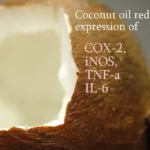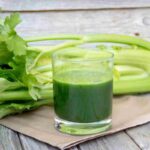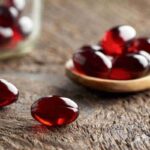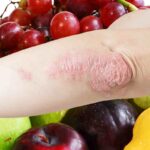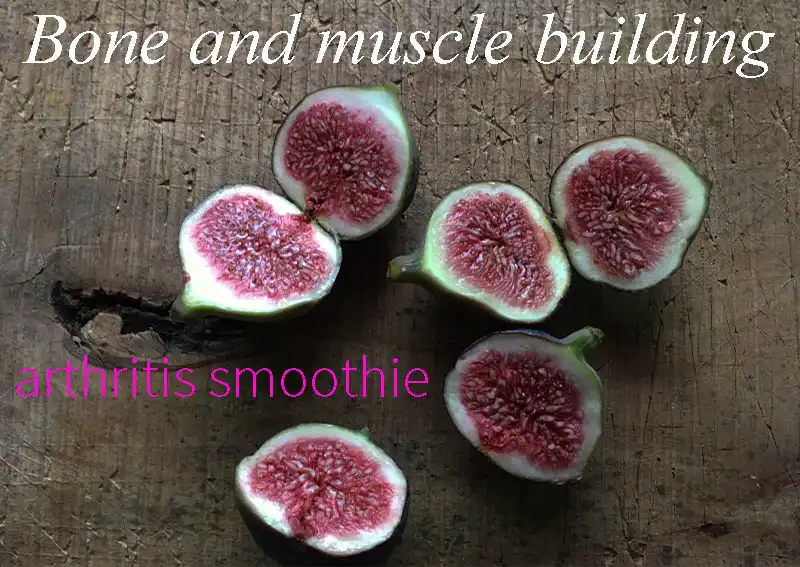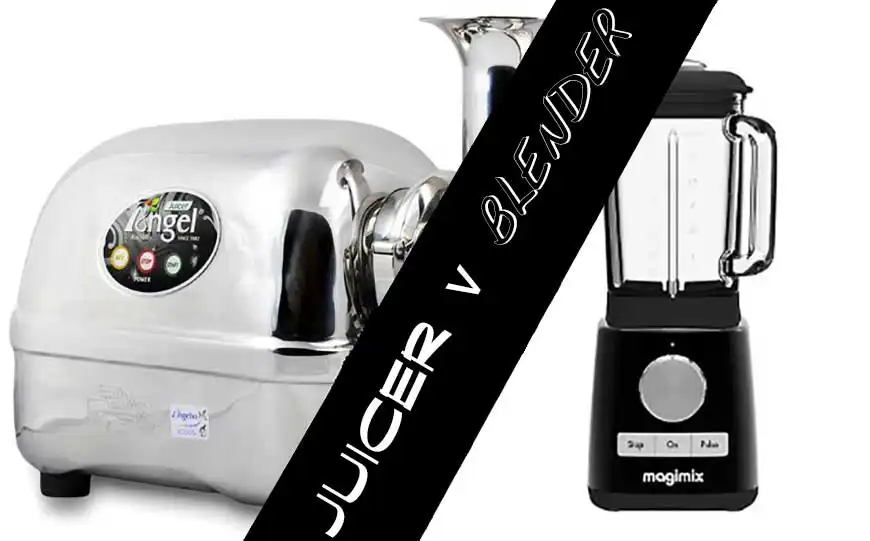Are you looking for a natural way to reduce inflammation? Try this powerful pineapple and pomegranate juice! Packed with antioxidants, vitamins A & C, and anti-inflammatory properties, this combination of fruits can help combat inflammation in the body and give you a nutrient boost.
The benefits of pineapple and pomegranate juice extend beyond simply reducing inflammation. Pineapple is rich in Vitamin B-6 which helps promote healthy cell growth and development as well as aids digestion. Pomegranate is also known to be high in minerals such as iron, zinc, potassium, and even calcium for strong bones.
Making your own powerful pineapple and pomegranate juice couldn’t be easier – all you need is fruit and a blender or juicer. Simply cut the pineapple into small pieces (or whatever size works best for your juicer) before adding it to the pomegranate.
It’s clear that a powerful pineapple and pomegranate juice can provide relief from inflammation but there are also other health benefits associated with it too. So please read on for the full low down on this beautiful-tasting juice.
Spoilt with Summer fruits
I really look forward to this time of year, not only because the weather improves but everyone seems just that little bit happier, the leaves are on the trees, everything’s in flower and that can only mean one thing….. Stacks of cheap fruit. Perfect for creating one of our favourite pineapple and pomegranate juice!
If you’re anything like me, you’re not satisfied with the normal everyday fruits! Apples and Oranges are truly fabulous fruits, plentiful all year round and great for bulking out your juices when other fruits and vegetables aren’t available, but there’s something mysterious about fruits that only appear at certain times of the year.
One of the things People say to me when I tell them I juice Pomegranate is that they find them difficult to peel, well it just so happens I’ve made you a little video so you can see how to get at the succulent seeds yourselves. Scroll down a little way for the video or click here to see it on Youtube along with the rest of our videos
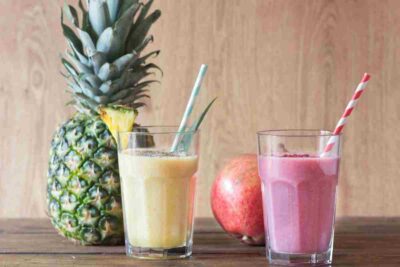
Pineapple and Pomegranate juice is as tasty as it gets
I have to say, I’ve never met anyone who doesn’t like the taste of Pineapple and Pineapple juice for that matter.
This outrageous-looking fruit is now widely available all year round in the UK and it’s cheap too, especially in summer. During the summer months, it’s possible to buy huge pineapples that literally provide enough fruit for 2 large glasses of juice, and the cost? Around 50p. You can’t get a better juice yield than that from any fruit.
These fabulous fruits are packed with vitamins and enzymes that not only help control your Rheumatoid arthritis but help to support the immune system and promote overall health
Anyway, back to juicing our Pineapple and Pomegranate juice!
As I promised a little earlier, here’s the video of me removing the seeds from a Pomegranate, it takes about 1 minute and doesn’t require anything more advanced than a knife and a colander.
How to make a Powerful Pineapple & Pomegranate Juice
You are going to need the following produce to make enough Pineapple and Pomegranate juice for 2 people
1 Large Pineapple
2 large Pomegranates
As you can see, we are using the Angel juicer today but you can use any juicer that you like to make your pineapple and pomegranate juice. The only other things you will need are a chopping board, a colander, and of course a large knife.
Preparation
Firstly you will need to remove the seeds from the Pomegranates, you can see how to to this in the video above
Next, take the Pineapple and cut off the base and the top.
Remove the rough outer skin from around the pineapple by cutting from top to bottom, removing just enough of the skin so you don’t see the dark indentations on the yellow fruit.
Once the outer skin is removed you can cut down either side and then along the edges, just leaving a 1-inch square piece in the center that contains the core of the Pineapple. Do not discard the core, you’re going to juice that too.
Squishing your Pineapple and Pomegranate juice
We are going to start by juicing some of the Pineapple, the thing with Pineapple is it’s a very fleshy fruit and tends to clog the juicing screen. A simple way of preventing this is to add some tougher produce to the mix when you feel that the juicer is getting clogged, in this case, the Pomegranate seeds act as the perfect companion not only to the tasty juice but also to flush out the Pineapple from the juicing screen.
Follow the guide below on when to alternate the fruits and you shouldn’t have any problems with a blocked juice screen or the foam from the Pineapple coming back out of the top of the juicers feed chute.
- Add 3 to 4 pieces of Pineapple
- Add half of the Pomegranate
- Add the core of the Pineapple
- Add the rest of the Pineapple
- Add the last of the Pomegranate seeds
As you can see in the video below, the Angel juicer does a fantastic job of demolishing these fruits and makes short work of producing the pineapple and pomegranate juice. The ball of pulp that’s left at the end is just incredible, virtually dry! Whoever would have thought that such a large mass of fruit could be reduced to something not much bigger than a golf ball?
The results of the juicing
So what does pineapple and pomegranate juice taste like????? Absolutely Delicious!
I have to say, out of all the juices we make, I think pineapple and pomegranate juice is one of my favorites, it’s not too sweet and the Pomegranate balances it out nicely with its tart, acidic flavor.
If your looking for a juice that isn’t too difficult to make but has a good range of nutrients and a full range of antioxidants then look no further, it also happens to be extremely tasty.
How nutritious is pomegranate?
Pomegranate is packed with essential vitamins, minerals, and nutrients. It contains Vitamin A, Vitamin C, Calcium, Iron and other trace minerals. It is low in fat and calories but high in dietary fiber. A one-cup serving of pomegranate seeds provides 83 calories, 1.2g of total fat, 2mg of sodium, 237mg of potassium, 18.7g of carbohydrates, 4.4g of dietary fiber, 13.7g of sugar, and 1.7g of proteins per serving.
Pomegranate is also a great source of powerful antioxidants such as polyphenols, flavonoids and phenolic acids. These antioxidants can help protect against free radicals that are linked to chronic diseases such as cancer and heart disease. They may also help reduce inflammation in the body and improve overall health.
According to the US Nutritional Database,1 cup (174g) of pomegranate seeds contains:
- Calories: 83
- Total fat: 1.2g
- Sodium: 2mg
- Potassium: 237mg
- Total carbohydrates: 18.7g
- Dietary fiber: 4.4g
- Sugars: 13.7g
- Protein: 1.7g
- Vitamin A 7%, Vitamin C 14%, Calcium 1%, Iron 4%
The health benefits of pomegranate
Pomegranate extract has been known to reduce the incidence and severity of collagen-induced arthritis, in studies performed on Mice. The application of this research has seen positive results in lower levels of disease activity in patients with Rheumatoid Arthritis.
An eight-patient pilot study conducted by researchers in Israel has shown the following results in patients that took Pomegranate extract over a 12-week period
- Reduced the composite Disease Activity Index (DAS28) of arthritis by 17 percent
- Reduced the tender joint count by 62 percent
- Significantly reduced serum oxidative status, indicating a reduction in the inflammatory response
The authors of the 2011 study concluded:
“Dietary supplementation with pomegranates may be a useful complementary strategy to attenuate clinical symptoms in RA patients.”
You can view the study here
A further study carried out in 2013 and available to view here looked into the benefits of using Pomegranate extract to attenuate bone loss in major musculoskeletal diseases including RA the report goes on to conclude:
All the studies reported positive effects of pomegranate extract or juice on osteoporosis, osteoarthritis and rheumatoid arthritis
Pomegranate and its powerful antioxidants
Taking Pomegranate juice has wider implications for joint and heart health, the main reason for this optimism is the fact that Pomegranate juice has been shown to have particularly high levels of antioxidants.
The antioxidants found in Pomegranate are so potent that when Pomegranate juice was compared to 10 other Poly-phenol rich drinks including Concorde grape, Acai berry and Blueberry juice, Pomegranate came out on top! The most potent and healthful of them all was in fact the juice of the Pomegranate, to put it into context the juice was so potent that it beat its nearest rival by a massive 20%.
Pomegranate juice contains almost every type of antioxidant including punicalagin and punicalins which account for around half of the pomegranate’s antioxidant qualities
You can see the study here
How nutritious is pineapple?
Pineapple is a tropical fruit that’s packed with nutrients and health benefits! It is high in vitamins A and C, as well as dietary fiber. The fruit also provides the body with manganese, copper, and folate. Pineapple is low in calories and fat-free, making it a great snack for anyone looking for a nutrition boost!
According to the US Nutritional Database, 1 cup (165g) of sliced pineapple contains:
- Calories: 82
- Total fat: 0.2g
- Sodium: 1mg
- Potassium: 156mg
- Total carbohydrates: 21.6g
- Dietary fiber: 2.3g
- Sugars: 16.3g
- Protein: 0.8g
- Vitamin A 4%, Vitamin C 79%, Calcium 2%, Iron 3%
Pineapple is also known for its high antioxidant content, including polyphenols, flavonoids and phenolic acids
These antioxidants can help protect against free radicals that are linked to chronic diseases such as cancer and heart disease. They may also help reduce inflammation in the body and improve overall health.
Pineapple and it’s healthy Enzymes
Pineapple, as you have probably heard is a fantastic source of a much-heralded Enzyme called Bromelain.
Bromalaine and Arthritis
Bromelain has long been vaunted for it’s anti-inflammatory properties, something every RA sufferer knows is key to controlling and putting into remission Rheumatoid arthritis.
A recent study, that can be viewed here looked into the effects of combining Devils claw, Turmeric, and bromelain and concluded the following observation in patients with osteoarthritis
The improvement of joint pain was clinically relevant in patients treated with AINAT for both acute and chronic OA pain. Considering its excellent tolerance profile, the tested complex of 3 plant extracts with antiinflammatory properties may be a valuable and safe alternative to NSAIDs in patients suffering from degenerative joint diseases.
Bromelain and cancer
Bromelain has recently come under the spotlight for it’s ability to potentially fight cancer, bromelain contains chemicals that interfere with the growth of tumor cells and slows blood clotting. Clinical studies have been conducted and one, in particular, showed that human breast cancer cells exposed to bromelain exhibited a growth slowdown followed by a breakdown in the structure before dying off completely
The study is available here
Bromelain and Asthma
Bromelain has been shown to improve the lot of patients who suffer from Asthma by reducing airway inflammation, the study which you can read here concludes as follows:
The results suggest that bromelain has a therapeutic effect in established AAD, which may translate into an effective adjunctive therapy in patients with similar conditions, such as allergic asthma
Conclusion
With all of the potential health benefits on offer from this fruity health tonic, can you afford not to try Pineapple and Pomegranate juice!
If you want to find some more amazing juices to make there are lots more in our juicing section or try this post on wheatgrass for some goodness you can grow at home.
http://www.ncbi.nlm.nih.gov/pubmed/21910371
http://www.ncbi.nlm.nih.gov/pubmed/24200293
http://pubs.acs.org/doi/abs/10.1021/jf073035s
http://www.ncbi.nlm.nih.gov/pubmed/24473984
http://www.ncbi.nlm.nih.gov/pubmed/20848558
http://www.ncbi.nlm.nih.gov/pubmed/22894886


